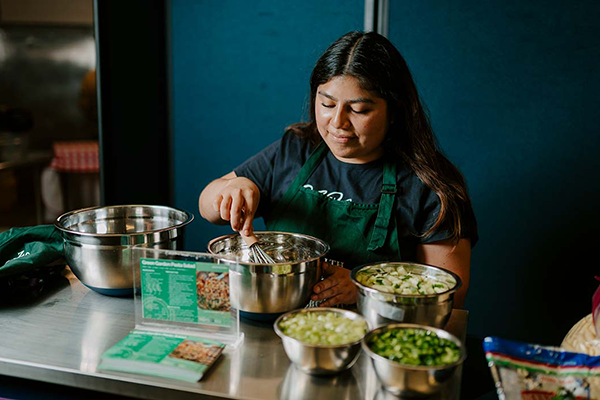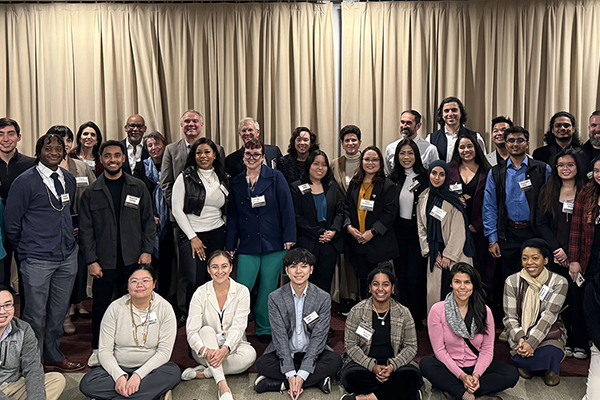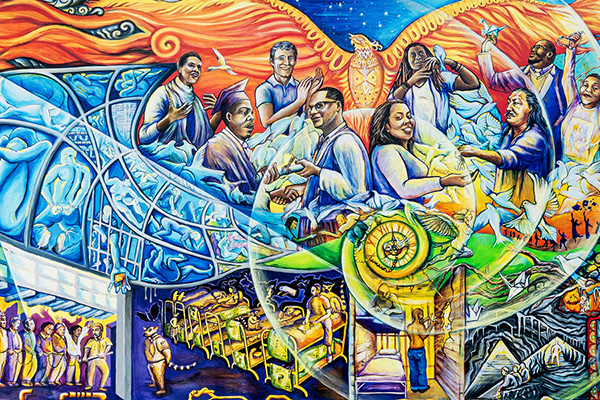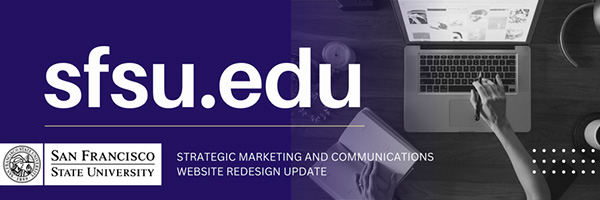News and Announcements

When people think about the holiday season, food is on the top of nearly everyone’s mind. Holiday time or not, unfortunately, not everyone has the same access to nutritious food. Throughout the year, SF State programs like Health Promotion & Wellness (HPW), the Basic Needs Initiative, Associated Students (AS) and more aim to help all students access fundamental needs like food. In fact, there are so many food resources for Gators, HPW Registered Dietitian Nutritionist Anjuman Shah worries that students don’t make use of them as much as they could.
“I think there are a lot of students who aren’t utilizing these resources because they think they’re taking away from other students who might need it more,” said Shah, who meets with students for one-on-one nutrition support. “To those folks, I’m saying that’s really sweet of you to do that. But it’s also OK for you to utilize these resources. College is a difficult time financially and mentally for a lot of people.”
Beyond the resources listed below, HPW has accessible online resources such as nutrition information (how to read labels, budget planning, in-season produce, etc.), a student-produced budget-friendly cookbook and YouTube videos. Students can also schedule a nutrition appointment with Shah to get personalized guidance to fit their dietary needs.
AS Food Pantry and Gator Groceries
Associated Students Gator Groceries and Food Pantry are two weekly programs providing students with free groceries to create nutritious meals. The programs are run in partnership with the San Francisco-Marin Food Bank, which delivers a large truck of food each week. Food is rationed to ensure that all food items are available each day, so if an item runs out one day, Shah recommends trying to visit again. The similar names sometimes cause confusion, Shah says. She wants to remind students that Gator Groceries and the Food Pantry are two separate programs with similar services, which means students have more opportunities to pick up free groceries.
Follow these programs on Instagram for updated information and a preview of what’s available each week.
Key similarities and differences
| Food Pantry | Gator Groceries | |
| Food Pickup Date/Time | Monday: 1 – 5 p.m. Tuesday, Wednesday noon to 5 p.m. |
Thursday, Friday 11 a.m. – 4 p.m. |
| Available food | Mainly fresh produce, some protein, dairy products, maybe some snacks. Students can pick the items they need. | Mainly pantry staples like grains (rice, pasta, quinoa), spices, seasonings, sauces, etc. |
| Location | Recreation & Dining Level of the Ceasar Chavez Student Center (Walk-ins only; you just need a student ID.) |
|
CalFresh Help Clinic
CalFresh is a program that helps low-income students purchase healthy food. Students approved for the program receive monthly support to purchase healthy groceries. Schedule an appointment with the CalFresh health assistant to learn more and get started on your application. Not only will they help you fill out the application — they can help you assess your eligibility, address any questions and help you navigate the post-application process.
Gator Grub Alerts
Students can opt in to receive Gator Grub Alerts via the SF State Mobile App to be notified of free food on campus. Once staff/faculty post on the app, students get a notification that is valid for 30 minutes. Food is first-come, first-served. Shah says some groups, like one of the dining halls, post an alert every Friday afternoon for any excess food as part of its own sustainability efforts.
“It’s been really successful so far, but we’re hoping to get more students to opt in,” Shah explained. “I think a lot of folks who live on campus opted in for notifications. I think it’d be great to get a lot of students who commute to campus and are just on campus all day to opt in for these notifications.”
Cooking demos and workshops
HPW offers various cooking demos and workshops throughout the semester. Shah and her team often do free demos on Malcolm X Plaza and share free samples and recipe cards. Demos can be for main meals or snacks, ranging from salads to curry to vegan gumbo. Past recipes can be found online. Usually, these demos are designed to utilize the produce available in that week’s AS Food Pantry so students have everything they need to make a nutritious meal immediately. HPW also offers free workshops on everything from meal planning to shopping on a budget to buddy cooking classes. Upcoming events can be found on the HPW events page.
Emergency meal card program
This program is a partnership between FSS and Sodexo to provide free meals at Monarca Dining Hall to University students facing food insecurity. Meal cards provide 10 meals at Monarca Dining Hall. Every semester, Sodexo donates nearly 2,000 meals to FSS. This is an emergency program providing one-time support for students in crisis.
Visit Health Promotion & Wellness and Food+Shelter+Success for information about nutrition and other basic needs resources.
Photo by Juan Montes

SF State’s office of Career and Leadership Development (CLD) celebrated the 10th anniversary of the President’s Leadership Fellows Program (PLFP) on Nov. 13, bringing together alumni, University leaders and supporters to commemorate a decade of transformative impact. The event also honored philanthropist Kathy Kwan, whose support has been crucial to the program’s success.
Since its launch in 2014 as a pilot initiative serving just 25 students in the Lam Family College of Business, the PLFP has grown significantly. Today, it’s equipped over 2,000 students across all disciplines with the skills needed to thrive in the professional world. The program, which transitioned to CLD in 2017, provides career-focused leadership training and mentorship through a semester-long curriculum. Open to juniors, seniors and graduate students, it meets weekly over lunch, offering interactive workshops on essential career skills such as resume building, interview techniques and networking. Participants also engage in self-exploration activities to build confidence and articulate their strengths.
Kyle Crier, a 2018 Business Administration graduate, participated in PLFP as an undergraduate and considers it one of the highlights of his time at SFSU. “The program taught me to hold myself to high standards — something that sets you apart in any role,” said Crier, now a recruiting operations manager at the online learning platform Brilliant.org. “PLFP provided me with practical skills, like networking and business communication, that I use every day in my career. It laid the foundation for my professional journey in the best way possible.”
Sophie Clavier, dean of Graduate Studies and Career Development at SFSU, said the program can transform students into professionals. “PLFP workshops aren’t just about teaching skills; they’re about unlocking each student’s potential, shifting their mindset and empowering them to lead with confidence, purpose and a vision for positive change."
For Gigi Huie, a graduate in Hospitality and Tourism Management who now works as a financial analyst at the University of California, San Francisco, PLFP was a pivotal experience. “The program challenged me to think critically, push boundaries and embrace new ideas,” she said. “It has shaped my career path and instilled a lifelong commitment to leadership and service.”
The PLFP’s success has been supported by a generous donation from the Eustance-Kwan Family Foundation, which has contributed over $4 million to SFSU and CLD programs over the past decade. Kathy Kwan, the foundation’s founder, was inspired to give back to her parents’ alma mater. Her parents, who grew up in San Francisco’s Chinatown, were the first in their families to attend college despite facing significant barriers. Kwan’s philanthropy is a way of paying it forward, ensuring that future generations of students have access to the mentorship and resources that helped her family succeed.
“If you can get a student into a mentorship program, and they go through career services and leadership development, their chances of landing a great position are much higher than if they were left on their own,” Kwan said. “San Francisco State University is truly an engine of upward mobility.”
Please visit the Career and Leadership Development website to learn more about the President Leadership Fellows Program.

Project Rebound has won the President’s Award for Distinguished Contributions to Justice from the American Society of Criminology. Jason Bell, who has served as director of Project Rebound at SF State for 10 years and has worked with the program for over 20 years, accepted the award on behalf of Project Rebound and the many people who have, for decades, made Project Rebound a transformative program.
Professor John K. Irwin founded Project Rebound in SF State’s Sociology Department in 1967 to support formerly incarcerated students like himself through the admission process and provide wraparound support during their academic careers. With a dedicated team, Bell has led an expansion effort to bring 18 additional CSU campuses into the Rebound family.
For more than 50 years, Project Rebound has made higher education more accessible to and supportive of formerly incarcerated students. By doing so, Project Rebound has extended the reach and impact of higher education, changed people’s lives and contributed to diverse communities.
The President’s Award for Distinguished Contributions to Justice is given annually to an individual or organization who, through either a single initiative or over a longer period of time, has made significant and distinguished contributions to the cause of justice.
Photo: The ‘Incarceration to Liberation/De la Encarcelación a la Liberación’ mural by Juana Alicia in the Cesar Chavez Student Center. Photo by Garry Belinsky.
The Environment, Health and Safety department would like everyone to have a safe and healthy holiday. For 10 years the department has been sharing holiday safety tips, with one song.
To celebrate, the department presents a holiday safety Challenge: Can you suggest a holiday safety tip that’s not on this list? Please email your tips to sfehs@sfsu.edu to have them included in next year’s holiday safety message.

SF State is in the second year of a three-year web content redesign project. Approaching the final phases of this initiative, the University is entering the critical content revision stage and will need the campus community’s help.
This fall, Strategic Marketing and Communications (SMC) will develop a comprehensive content matrix as the foundation for the revision process. In spring 2025, SMC will contact departments to initiate the content revision phase. SMC encourages employees to start to consider responsibilities for managing web page content in their respective departments.
The sfsu.edu website is SF State’s most visible public-facing brand asset. It plays a central role in engaging the University’s primary audiences: prospective and current students. To ensure the website reflects their needs and enhances their experience, SMC appreciates collaboration from employees to review and revise content.
Please visit the Website Content Redesign Project page for regular updates and insights.
The Registrar’s Office is excited to announce new digital resources.
- On-demand enrollment verification: Students can now access and download an official enrollment verification certificate on demand, through the National Student Clearinghouse MyHub portal. Instructions for how to access and download enrollment verification certification can be found on the Academic Verifications page under “Enrollment Verification Certificate (Official).”
- DocuSign forms: The registrar’s first DocuSign form is now available. The Records Release Authorization form allowing students to grant permission for the Registrar’s Office to share information from student records with a third party such as a family member.
More form updates will come during the spring semester, such as the Name Change form.
Does your course include community-engaged learning (CEL)? Or do you think it could? Here’s a chance to explore where faculty members’ courses fall on the CEL spectrum — while also entering to win a $500 professional development funds.
Complete the Community Engaged Learning Tool (CELT) by Friday, Dec. 5:
- Gain valuable insights on integrating CEL into course design
- Reflect on CEL practices and identify areas for growth
- Discover new strategies to strengthen community partnerships and improve teaching
- Help the University better understand the landscape of community engagement on campus
- Qualify for a chance to win $500 in professional development funding, transferred directly to your department.
Please visit the Institute for Civic and Community Engagement website to enter and for information.
The Academic Senate fall 2024 Special Election voting period is open to vote for the faculty members of the Institutional Review Committee. The committee is the first step in the Academic Program Discontinuance process (as detailed in policy S24-177). Voting will occur through Friday, Dec. 13.
Please cast your vote online (SFSU login required).
For questions, please email the Office of the Academic Senate at senate@sfsu.edu.
The SF State Academic Senate will meet Tuesday, Dec. 3, 2 – 5 p.m., via Zoom for its seventh meeting of the academic year.
- Informational items
- CSU Academic Senate resolution packet, November 2024
- Board of Trustees meeting handouts
- Consent item recommendations from the Campus Curriculum Committee
- Proposal for substantive decrease in units: Minor in International Business
- Distance Education Authorization: B.S.-RN in Nursing (ADN-BSN)
- Items in second reading from the Faculty Affairs Committee
- Resolution to Prioritize Academic Instruction and Support During Times of Budget Cuts
- Hiring Policy for Tenure-Track Faculty
- Items in first reading
- Recommendation from the Educational Policies Council: Graduation Requirements for Baccalaureate Students
- Recommendation from the Academic Policies Committee: Academic Calendar Policy
- Recommendation from the Campus Curriculum Committee
- New certificate: Multilingual and International Tourism Competencies
- New certificate: Multilingual and International Business Competencies
- New certificate: Certificate in Global Health
- Name change: Master of Arts in Cinema and Media Studies
- Academic Senate will hear formal presentations from:
- Guisselle Nuñez, associate vice president of Strategic Marketing and Communications: “Next Marketing Campaign” (time certain 3:30 – 3:45 p.m.)
- Sara Meeks, Follett market leader; Annie Mellinger-Watts, Follett regional sales and operations manager: “Immediate Access” (time approximate 3:45 – 4 p.m.)
The Lam-Larsen Distinguished Lecture Series presents a discussion on “Public Policy and Corporate Strategy in the Age of AI and a Changing World” on Tuesday, Dec. 3, noon – 2:30 p.m. The discussion will feature Lenny Mendonca, senior partner emeritus at McKinsey & Co. and former chief economic adviser to California Gov. Gavin Newsom, and will be led by Chris Larsen (B.S., ’84), co-founder and executive chairman of Ripple.
The 37th Annual Stillwell Student exhibition opens Tuesday, Dec. 3, 4 – 6 p.m., and runs through Thursday, Dec. 12 in the Fine Arts Gallery (Fine Arts 238).
Any undergraduate student enrolled in a School of Art class was invited to submit up to two works for the jury’s review. The jury is comprised of students in Art 619: “Exhibition Design,” taught by Kevin B. Chen.
Please join for a celebration of more than 90 works by these new and emerging artists. The Fine Arts Gallery regular hours are Tuesdays – Fridays, noon to 4 p.m. For this exhibition the Fine Arts Gallery will also be open Saturday, Dec. 7, noon – 4 p.m.
The Student Fee Advisory Committee will meet on Monday, Dec. 9, at 2 p.m. via Zoom. The committee will review any requested changes to student fees from the SF State community.
Please email any questions or requests to Student Affairs and Enrollment Management at vpsa@sfsu.edu by Saturday, Dec. 7.
SF State Spotlight
Mayumi Hagiwara, associate professor of Special Education, has published a book titled “Promoting Self-Determination for Students with Intellectual Disability Through Standards-Based Instruction.”
Hagiwara and her team trained 15 Japanese special -ducation teachers to develop and implement instruction with the focus on self-determination for six months and wrote about how the instruction went. They saw positive outcomes among students with intellectual disability.
Recreation, Parks, Tourism and Holistic Health Professors Erik Peper and Richard Harvey are co-authors of “Breathing for health: Mastering and generalizing breathing skills,” published in Townsend Letter on Nov. 15.